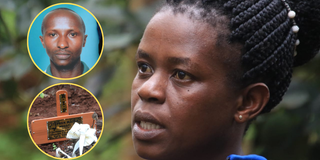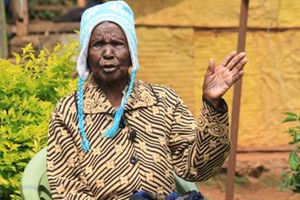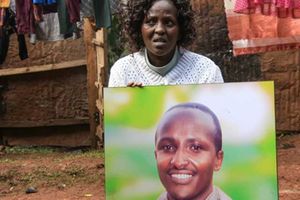
Mary Wangare Maina recounts her final moments with her husband, Stephen Maina Nduati, who was tragically killed by residents.
Mary Wangari's husband, 48-year-old Stephen Maina had on Tuesday, July 9, 2024, retired to bed at around 1 am a troubled and injured man.
He had fought with his brother Joseph Kibugu, 45, at 10 pm.
While his brother was rushed to hospital in a critical condition, Mr Maina survived the fight with three panga cuts - on the wrist of his right hand, the back of his head and his back.
"He went to bed a troubled man. He is a nice man whom I married in 2012, his only problem was his love for alcohol. Once drunk, he would behave wildly," Ms Wangari said.

Widow Esther Wambui, Mzee Jamlick Nduati and his wife, Roseline Wanjiru, recount the devastating loss of Joseph Kibugu and Stephen Maina on August 14, 2024.
She remembers his tears, which kept him awake.
"He cried for about 10 minutes, and I held him and told him that everything would be fine. He said he agreed with me that alcohol had led him astray. He regretted why he had gone to his brother's house to fight him," said Mrs Wangari.
She says her husband proclaimed God as his personal saviour, asked her to pray for him and vowed that the following Sunday he would go to the local Presbyterian church, where his wife was a parishioner, to tell the world about his Damascus moment.

Mary Wangare Maina recounts her final moments with her husband, Stephen Maina Nduati, who was tragically killed by residents.
She says Maina was a troubled man, and three times he screamed in his sleep like a man having a nightmare.
She added that in the 12 years they lived together and were blessed with three children, he had tried to quit alcoholism five times, but always wavered and returned to the habit.
Ms Wangari, an early childhood development tutor, said she woke up at around 5 am that Wednesday to prepare her children for school.
"I made tea, saw my children off and my husband joined me in the kitchen at 6:30 to have tea. He was very quiet, thoughtful and tearful. I comforted him that everything would turn out well. We prayed together again," she says.
She left for work at 7:30 am to walk the two kilometres to school.
"But not before we prayed again - for the third time in six hours. Before leaving the house, he called me back, asked me to kiss him, hugged me tightly and for a moment I considered not going to work and being there for my troubled husband," she said.
But she says she thought of the 23 children waiting for her company at school and quickly abandoned the idea of not showing up for them.
"I told my husband to take heart, that I was there for him in all his inner struggles. I reminded him that we had been through the ups and downs of our marriage together and that we had grown stronger in love," she says.
And she left the house.
"It is about 100 metres from my house to the Gachocho shopping centre. I saw unusual groups of people talking. I felt uncomfortable because at the same time, the groups of people were facing me and an air of contempt seemed to be hovering around me," she says.
Alarmed, she asked one of her neighbours what was going on and the bomb dropped.
"Your husband's brother, who was taken to hospital last night, has died. That is the hottest news being discussed here," Ms Wangari recalls the friend saying.
She says she was torn between going home and warning her husband that something was wrong or calling him on his mobile phone to pass on the news.
There was no need to make a decision as she saw her husband coming into the shopping centre.
"He came to me and I gave him the news in a quiet voice, adding that it would be safer for him to disappear from the area," she said.

A portrait of Stephen Maina Nduati, who was tragically killed by residents after being forcibly removed from a police station in Gachocho village, Murang'a, a month ago. He had allegedly assaulted his brother, resulting in his death following a family dispute.
She says her husband looked remorseful but calmed down and said he would go to the morgue at Muriranjas Hospital to see his brother's body.
He added: 'If I am arrested, know that my home is yours, take care of our children and pray that God's justice will direct the judge to find that it was not intentional, that it was my bad choice to be an alcoholic."
She adds that her husband looked into her eyes and said: "My dear, I know you're strong, I'm sorry for putting you through this nightmare.
Mrs Wangari says she went to work a very disturbed woman, not knowing what to expect from the chapter that was unfolding.
Her workplace, she explains, is a ridge away from her home.
"At around 9 am, my husband called me to tell me that he had been arrested. He sounded calm. His last words to me were: Don't get stressed, let me fight this in court... I love you, be strong and he blew me a kiss," she said.
At around 11 am, she says a friend called her to say that Gachocho market was full of angry youths who were fighting with the police.
The friend told her that the youths had vowed to kill her husband, who was in custody.
This news, she says, disturbed her so much that she reviewed her previous marital life.
She says there have been times in their 12-year marriage when she felt her husband's alcoholism was destined for tragedy.
"But every day was filled with optimism that he would change. Sometimes I felt I should leave him, but I loved him. My children loved him and, apart from his alcoholism, he was a hard-working man," she says.
Around 2.30 pm, she says, shots rang out.
"We could hear them from where I was working. I called a friend and was told that all was not well at the police patrol base... that it was under siege and that someone had been murdered by the youths," she reveals.
She asked the friend if it had been established who had been murdered, and the answer that it was her husband, hit her like a thunderbolt.
"I left my workplace and went to the morgue at Muriranjas Hospital, where I was told his body had been brought. There he was... literally without a head. It had been crushed and there was a black polythene paper bag next to him. The mortuary attendant told me that it contained my husband's brain. I fainted," she says.
When she came to, she was alone under the shade of a tree where she had been taken to wait for her consciousness to return.
"I had become a widow... My husband had also caused the widowhood of his brother's wife. Double widowhood within 10 hours in one family. I wondered how we would live as a family... how our children would grow up knowing that family conflict had cost their fathers their lives," she says.
After the two brothers were buried in a joint ceremony on July 19, with no eulogy read, Ms Wangari began the long road to acceptance and healing from the tragedy.
"This family needs professional counselling. Our children also need counselling. At least I and my sister-in-law have reconciled. It was our husbands who fought, not us. Our six children together are friends," she said.
Ms Wangari said key questions remain unanswered.
"I have yet to understand why the police failed to take security precautions. Why did they detain a murder suspect just 100 metres from the scene of the crime? Why did they not move him when tensions in the neighbourhood rose to the point where tyres were set alight and roads in the area were closed? Is it true that the officers handed my husband over to the killer mob?" she asks.
A month later, she says, no investigation has been carried out.
"At least my sister-in-law can say that her husband's death was avenged. But mine is still waiting for justice. I would like to know who killed my husband and the officers who handed him over to his killers," she said.

Stephan Maina's grave.
She says she lives in fear of the traumatising incident, which has deeply affected her children.
Kigumo Sub County Police boss, Mr Kiprono Tanui, told Nation.Africa on the phone on Saturday, August 17, 2024, that investigations are ongoing and once completed, Mr Maina's killers will be charged in court.
"We are not advocates of jungle rule, anarchy and revenge. This is a country of law and order. All disputes must be resolved through legally established mechanisms and we will prove that to the people of Gachocho," he said.









